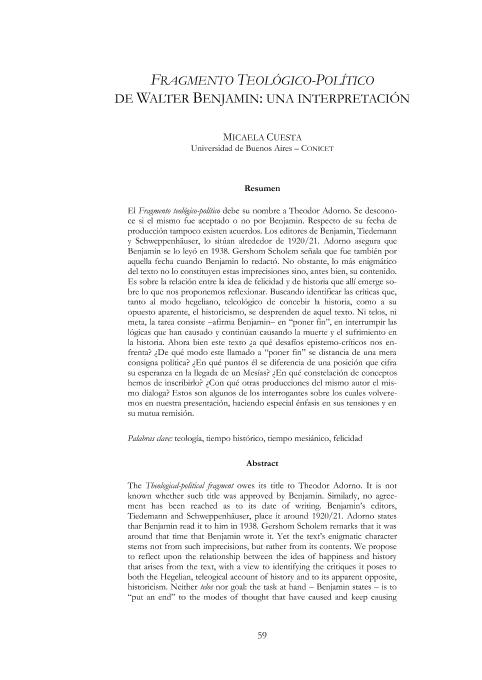Artículo
El Fragmento teológico-político debe su nombre a Theodor Adorno. Se desconoce si el mismo fue aceptado o no por Benjamin. Respecto de su fecha de producción tampoco existen acuerdos. Los editores de Benjamin, Tiedemann y Schweppenhäuser, lo sitúan alrededor de 1920/21. Adorno asegura que Benjamin se lo leyó en 1938. Gershom Scholem señala que fue también por aquella fecha cuando Benjamin lo redactó. No obstante, lo más enigmático del texto no lo constituyen estas imprecisiones sino, antes bien, su contenido. Es sobre la relación entre la idea de felicidad y de historia que allí emerge sobre lo que nos proponemos reflexionar. Buscando identificar las críticas que, tanto al modo hegeliano, teleológico de concebir la historia, como a su opuesto aparente, el historicismo, se desprenden de aquel texto. Ni telos, ni meta, la tarea consiste –afirma Benjamin– en ―poner fin‖, en interrumpir las lógicas que han causado y continúan causando la muerte y el sufrimiento en la historia. Ahora bien este texto ¿a qué desafíos epistemo-críticos nos enfrenta? ¿De qué modo este llamado a ―poner fin‖ se distancia de una mera consigna política? ¿En qué puntos él se diferencia de una posición que cifra su esperanza en la llegada de un Mesías? ¿En qué constelación de conceptos hemos de inscribirlo? ¿Con qué otras producciones del mismo autor el mismo dialoga? Estos son algunos de los interrogantes sobre los cuales volveremos en nuestra presentación, haciendo especial énfasis en sus tensiones y en su mutua remisión. The Theological-political fragment owes its title to Theodor Adorno. It is not known whether such title was approved by Benjamin. Similarly, no agreement has been reached as to its date of writing. Benjamin‘s editors, Tiedemann and Schweppenhäuser, place it around 1920/21. Adorno states thar Benjamin read it to him in 1938. Gershom Scholem remarks that it was around that time that Benjamin wrote it. Yet the text‘s enigmatic character stems not from such imprecisions, but rather from its contents. We propose to reflect upon the relationship between the idea of happiness and history that arises from the text, with a view to identifying the critiques it poses to both the Hegelian, teleogical account of history and to its apparent opposite, historicism. Neither telos nor goal: the task at hand – Benjamin states – is to ―put an end‖ to the modes of thought that have caused and keep causing death and suffering in history. What epistemo-critical challenges are posed by the text? How does this so-called ―putting an end‖ differ from a mere political slogan? Where does it differ from a position that pins its hopes on the arrival of a Messiah? In which constellation of concepts should we place it? With which other works by the same author can it converse? These are some of the questions to which we shall come back to, with particular emphasis in their tensions and their mutual abatement.
Fragmento teológico-político: una interpretación
Fecha de publicación:
06/2011
Editorial:
Universidad de Viña del Mar
Revista:
Analecta
ISSN:
0718-414X
Idioma:
Español
Tipo de recurso:
Artículo publicado
Clasificación temática:
Resumen
Palabras clave:
TEOOGÍA
,
TIEMPO HISTÓRICO
,
TIEMPO MESIÁNICO
,
FELICIDAD
Archivos asociados
Licencia
Identificadores
Colecciones
Articulos(SEDE CENTRAL)
Articulos de SEDE CENTRAL
Articulos de SEDE CENTRAL
Citación
Cuesta, Micaela; Fragmento teológico-político: una interpretación; Universidad de Viña del Mar; Analecta; 5; 6-2011; 59-74
Compartir




